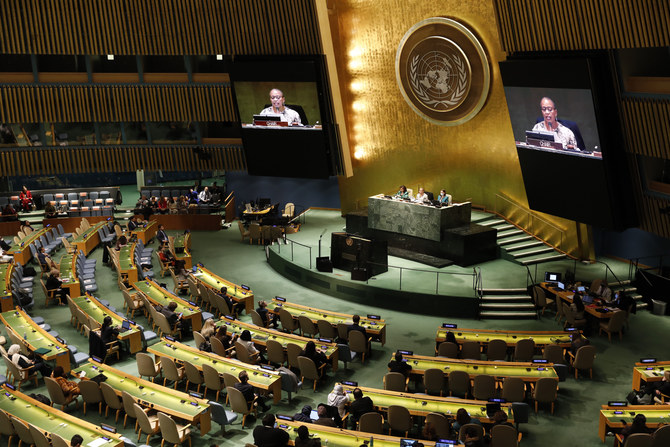
- ARAB NEWS
- 18 Jul 2025

Arab News
RIYADH: Saudi Arabia affirmed its keenness to strengthen partnership and cooperation with the UN and its various bodies at all levels and fields of development and women’s empowerment.
Sulafa bint Hamid Mousa, head of the Social, Humanitarian and Cultural Committee of the Kingdom’s Permanent Delegation to the UN, also stressed her country’s right to abide by its commitment to accept and agree with only what is consistent with its internal regulations and its religious and cultural values.
She was speaking during the 66th session of the Commission on the Status of Women (CSW66)— the second largest UN intergovernmental meeting in New York— on Friday, which was held under the title: “Achieving gender equality and the empowerment of all women and girls in the context of climate change, environmental and disaster risk reduction policies and programs.”
Mousa said that the Kingdom had worked to fulfil its duty toward the environment and climate change and to take the necessary and preventive measures by launching several initiatives and projects related to protecting the environment and addressing the effects of climate change.
She stressed the Kingdom’s keenness to set considerations for female participation in these programs and policy-making.
Mousa reiterated the importance of the agreements reached during the session, in particular the issues concerned with affirming the right for women and girls in achieving gender equality and empowering all women and girls in policies and programs related to climate change, the environment, disaster risk reduction, and the need to provide a working environment that guarantees conditions for occupational health and safety and obtaining equal returns for work in the field.
She called for strengthening laws and regulatory frameworks that prohibit discrimination against women, and working to develop and activate all laws and policies related to eliminating discrimination against women in the context of policies and programs related to climate change, environment and disaster risk reduction.
She said that in order for the final document to be integrated and balanced, it was essential to include paragraphs that enhance state sovereignty to preserve the national priorities of each state in a fair and equitable manner, adding it was necessary to include moderate and clear clauses on the family as the main unit of society in the agreed conclusions.
Mousa said the Kingdom was “disassociating from the terms contained in the text of the document, which are not considered languages agreed upon in the UN, and contradicts its principles, national laws and Islamic legislation,” including the different and intersecting forms of discrimination.
She added that the process of negotiating the document is a multilateral consensual process, encouraging the negotiation sessions to be characterized by more cooperation, flexibility and respect for different points of view, in order to reach consensus in the largest possible way.
She highlighted the spatial and temporal difficulties that accompanied the conduct of the negotiation sessions on the document, and the often lack of consideration of health measures related to the COVID-19 pandemic.
She said she hoped that this would be taken into account in future sessions, and requested that her statement be documented in the session’s report.